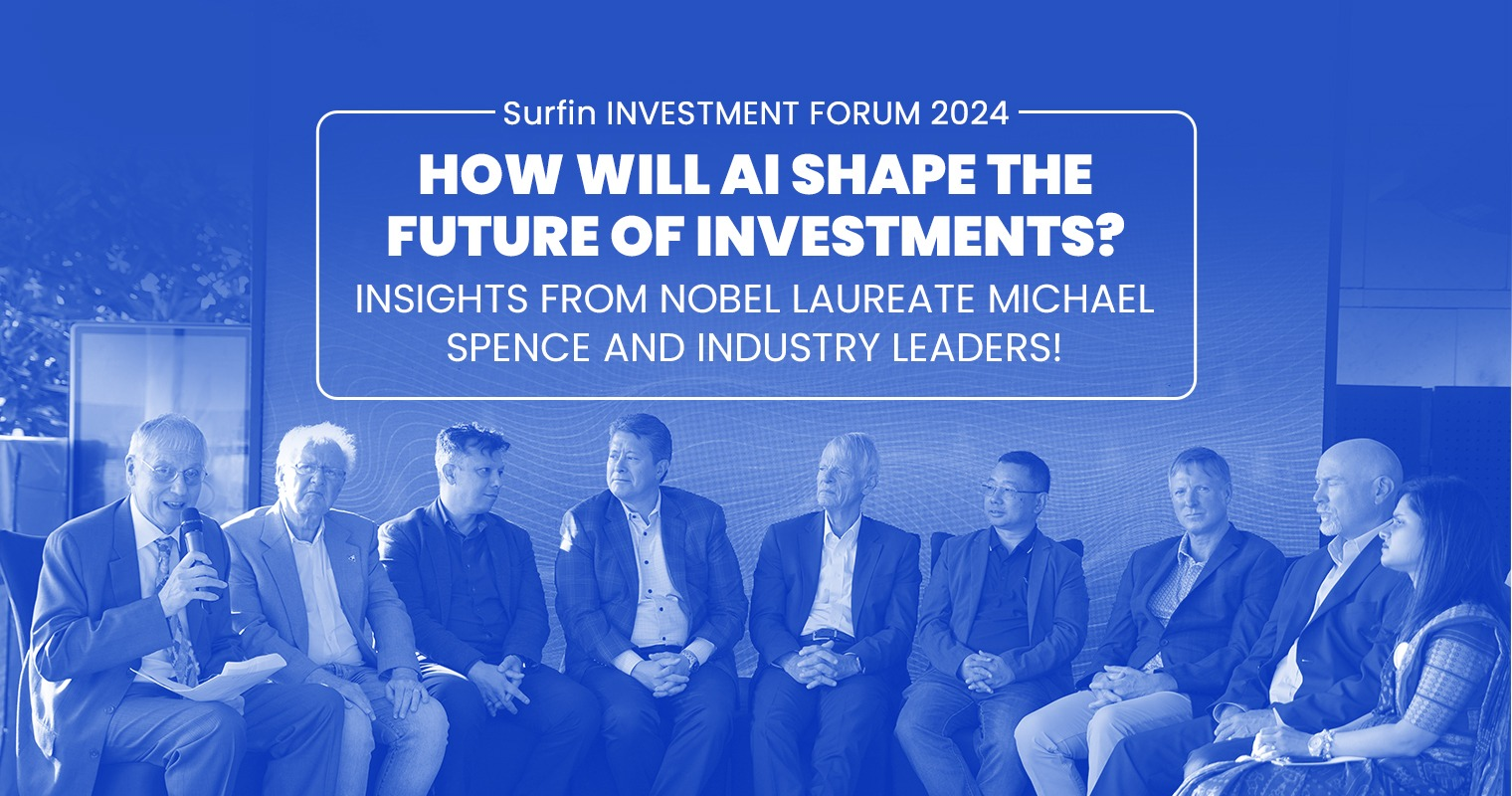
How will AI shape the future of investments?
Insights from Nobel Laureate Michael Spence and Industry Leaders!
What if AI could unlock new ways to grow our wealth? That’s exactly what was discussed at the Surfin Investment Forum 2024.
AI is already transforming every other industry and slowly taking us to an era that will be marked with the "age of AI", but can it have a similar impact on investments? Nobel Laureate Michael Spence and industry experts explored how AI can change the way we invest by helping us make smarter decisions, spot trends early, and access new opportunities.
Insights from the forum suggest that AI could open up exciting possibilities for investors by simplifying complex data and predicting market shifts.
Surfin Investment Forum 2024
Held at the luxurious Ritz Carlton in Bangalore, the Surfin Investment Forum 2024 gathered some of the brightest minds in finance and technology to explore how AI is reshaping the future of investments. The event, hosted by Sayyam Investments, featured key speakers like Nobel Laureate Michael Spence, who shared his insights on AI's potential to revolutionize the industry.

The forum included panel discussions on the impact of AI on economic trends, risk management, and portfolio optimization. Attendees also had the opportunity to interact with experts during networking sessions, gaining valuable insights into how AI-driven tools are creating smarter investment strategies and new growth opportunities. It was a landmark event that highlighted the intersection of cutting-edge technology and finance, setting the stage for a glimpse of the global economic outlook.
Insights from the Surfin Investment Forum 2024
At the Surfin Investment Forum 2024, some of the brightest minds in finance and technology, including Nobel Laureate Michael Spence, Yanan Wu, and other leaders from the Surfin Group, came together to talk about the future of finance and how AI is set to transform the industry. Their discussions touched on everything from the global economy and inflation to India’s growing role in tech and how AI can help businesses thrive. Here’s a look at the key takeaways.
The Big Forces Driving the Global Economy
Michael Spence explained that the global economy is being pushed and pulled by three major forces. First, we’re facing constant disruptions—wars, pandemics, and other shocks—that are reshaping the way we work and live. Second, many regions are not paying enough attention to these big shifts, which is causing productivity to drop. Finally, aging populations in many countries are slowing down economic growth, while younger nations are seeing faster development.
Spence also weighed in on inflation, which has been a hot topic for the last few years. In the past, emerging economies grew rapidly and helped keep inflation low, but now those forces are fading, and inflation could continue to rise. The gap between rising demand and a sluggish supply chain has made the situation worse. Initially, central banks thought the pandemic was to blame, but it turns out the problem is much deeper, leading to those sudden jumps in interest rates after decades of no significant change.
A Mixed Bag for Global Economies
Speakers at the forum offered a mixed outlook on how different regions are faring. The American economy, while stable, isn’t growing at an impressive rate, and Europe is dealing with deeper structural challenges. On the other hand, Asian economies, particularly India and China, are attracting foreign investments. However, there’s also concern about the possibility of an economic bubble forming in some areas. AI, they suggested, could be key to managing these complexities. AI has the ability to signal any uncertainty well in advance and can play a vital role in predicting bubble-like overvaluation or other forms of crisis.
Can AI Really Transform Finance?
The clear takeaway from the forum was that AI has the potential to reshape finance in a big way. Speakers discussed how AI can help investors by predicting market trends, managing risks, and making smarter investment decisions. With its ability to process massive amounts of data quickly, AI could give investors a huge edge, helping them spot opportunities and respond to changes faster than ever before. It’s a game-changer that could transform how the financial world operates.
India’s Role in the AI Revolution
Yanan Wu, Chairman and CEO of Surfin Group, put a spotlight on India’s potential to lead the global AI revolution. He sees Bangalore as a tech hub that could rival Silicon Valley, with the infrastructure and talent to make it happen. However, Wu pointed out that for India to truly take the lead, it needs to speed up its efforts in AI and technology.
One of India’s standout achievements, according to Wu, is UPI (Unified Payments Interface), which has turned the country into a cashless society and set the standard for fintech innovation worldwide. UPI has revolutionized digital payments, and Wu believes that India’s continued success in fintech will help solidify its role as a global tech leader.
Focusing on Customer-Centric Innovation
Another major point made by the speakers was the importance of businesses staying focused on solving customer problems in unique and effective ways. Wu and other leaders emphasized that companies that innovate and use AI to create smarter, more personalized solutions for their customers will be the ones that succeed in the AI-driven future. It’s all about staying ahead of the curve and adapting to meet changing customer needs. Businesses must focus on providing solutions that are either faster, better, or cheaper compared to industry standards.
Conclusion: How Will AI Shape the Future of Finance?
The Surfin Investment Forum 2024 was a huge success, offering deep insights into how AI will shape the future of finance. The answer to the question, “How will AI shape the future of finance?” was clear: AI is set to revolutionize the financial industry. It will help investors make better decisions, predict economic trends, and create new opportunities. As the world faces economic challenges, AI will be a vital tool in driving innovation, improving efficiency, and ensuring long-term growth across the financial sector.
